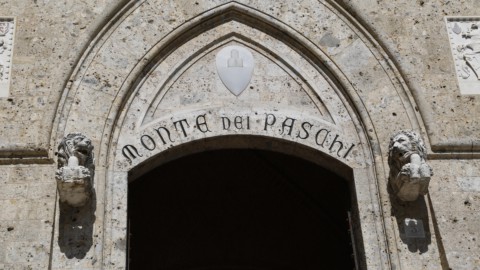The nuclear specter and the arrival of new sanctions, in a war whose end is not yet in sight, knocked out the European stock exchanges and determined the negative start of Wall Street.
As Russia launches new attacks against Ukraine and takes control of the Zaporizhzhia nuclear power plant, the largest in Europe, investors are fleeing equities and quickly looking for assets that back up their money such as gold, T-Bonds and Bunds, dollar. Meanwhile, the sanctions (and those that are being prepared) cause the prices of raw materials to skyrocket: gas, oil, wheat.
The markets were initially frightened by a fire that broke out in the building used for training the nuclear power plant's personnel and although the fire was extinguished and the plant was not touched by flames, the climate on the markets calmed down made progressively more incandescent.
Stock exchanges in free fall: at their lowest for a year
The week ends like this in the worst way for Business Square, which yields 6,24 and plummets to 22.464 points, at the end of a session with Telecom and the banks in free fall. Since the war began, the main Milanese stock market has lost more than 10%.
The picture is no better in the rest of Europe, where the lists are falling to their lowest levels for a year, weighed down above all by the securities of credit institutes and the auto sector. The volatility index in the euro area rises to 45 points for the first time since June 2020. The final photo sees Paris lose 4,97%, therefore Amsterdam -4,78% Frankfurt -4,39% Madrid -3,68% London -3,59%.
Moscow was closed for a record fifth consecutive day and is not expected to reopen before March 8. In the meantime, after the rating cut by Fitch and Moody's, S&P is also cutting its rating, which today evaluates Russia as “CCC-“, kept in CreditWatch Negative, for the growing risk of default.
The situation, among other things, seems destined to worsen for the Russian economy, but also for the rest of the world, after the G7 meeting of foreign ministers revealed that it is necessary to tighten sanctions against Moscow. And Putin warns: "If you do, the situation will get worse."
Pressure is also growing in the US and the UK to directly hit the Russian oil and gas sector in order to prevent export revenues from offsetting, even partially, the damages of the sanctions decided so far. This is a very delicate subject for half of Europe and in particular for Italy, which largely depends on these supplies.
Piazza Affari in very black jersey
The global picture bends Piazza Affari, which loses the most. telecom, after yesterday's beating, it fell by a further 15,56% reaching an all-time low.
Banks have also been sold with both hands, starting from Unicredit, -14,6%, the most exposed to the Russian market. The budget is heavy for Bper -10,58%; Understanding -9,01%; Bpm bank -8,68%; Mediobanca -8,4%. Also among the ten worst blue chips of the day Unipol -8,23%; Iveco -7,85%; General Bank -7,74%; stellantis -7,61%.
On the Ftse Mib there is not even a single action with a plus sign.
Out of the main basket, the gains continue up Gas Plus, -19,71%.
Stock markets in free fall: raw materials skyrocketing
The chronicle of the prices of raw materials is of a completely different sign and tenor.
Fly higher and higher gas, which updates record values in Europe. On the TTF platform, the contract expiring in April rose to 202,4 euros per megawatt hour, up 25,8% compared to yesterday's closing. The May deadline moved by the same amount to 196 euros per megawatt hour. Yesterday, prices had touched the 200 euro level, now broken through with the continuous worsening of the Ukrainian crisis.
It rears up further Petroleum, driven by fears of a possible blockade of Russian exports which would compensate for the return of Iranian supplies in the event of an agreement with Tehran. Moscow is the world's largest exporter of crude oil and petroleum products combined.
Brent and Wti futures are up: +3,92% for the former at 114,79 dollars a barrel; +4,5% the second to 112,51 dollars a barrel. This period is witnessing an escalation in price increases not seen since the 1974 oil crisis.
Purchases pour intogold: spot gold is currently trading at 1956,87 dollars an ounce, an increase of more than 1%. They also fly palladium, platinum, silver. During the session, wheat reached a record price of 400 euros per ton on the Paris stock exchange, gaining 38% in one week. Chicago corn climbed 3,31% to $773 a bushel; wheat +6,52% to 1.225,25 dollars a bushel.
The euro trembles and the prices of T-Bonds and Bunds rise
The situation does not encourage purchases on the euro, which is falling back to its lowest since 2020 and is trading ever closer to parity against the dollar, which now has to "spend" only 1,09 for a single currency.
The greenback index gains almost 1%.
The bull, fleeing equities, seeks shelter in bonds. In particular, the prices of T-bonds and Bunds rose.
I US stock prices they are up and yields down despite the strong jobs report in February which provides more arguments for the Fed to raise rates.
The 1,70-year Treasury yields 7,53%, down XNUMX% since yesterday's close.
Last month, 678 jobs were created in the US (excluding the agricultural sector) against much lower expectations. Unemployment fell from 4% to 3,8%, the best figure since the start of the pandemic, against expectations for a drop to 3,9%. In short, it does not seem that the job offers Jerome Powell any loopholes, although the average hourly wage has remained unchanged.
In Europe, the yield on the 0,1-year benchmark Bund returned negative (-162%). The Italian secondary closed in the red, with the spread at 3,71 basis points (+1,53%) and a ten-year BTP rate of +XNUMX%, unchanged compared to the day before.





